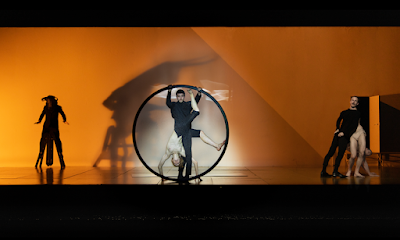conversations in ten questions 38 : Jan Möllmer
Our series, which we devoted to Dimitris Papaioannou's Transverse Orientation, which is currently touring the world stages, started with a playful essay written by our writers Ayşe Draz and Mehmet Kerem Özel. We continue our series with an interview with Jan Möllmer, one of the performers of the piece.
© Simon Baucks
Dimitris Papaioannou, in an interview with Mehmet Kerem Özel in Athens in December 2019 and published in Art Unlimited in February 2020, told performers from all over the world, from Canada to Korea, participated the audition for Transverse Orientation, which was under creation at that time. He said he was excited to be working with an international team for the first time, saying about the eight-person team, two of whom are Greek: “Now it seems that these talented people are willing to leave their homes and take an apartment in Athens in order to work with me. So, I’m taking advantage of the circumstances and I’m curious about what will happen. I’m enthusiastic with the cast. I wanted to experience that. I wanted to see how it would be. I have never done that before.” [link of the interview]
Jan Möllmer, one of the performers of Transverse Orientation, is a dancer/choreographer from Wuppertal. Being a guest dancer at Tanztheater Wuppertal and member of Folkwang Tanzstudio, Möllmer got the Young Talent Art Award in the category of Dance/Theatre by the German government of North Rhine-Westphalia in November 2015. Möllmer realizes and works in various projects and collaborations with artists from Germany and abroad in Peculiar Man, which he founded in 2017 with Tsai-Wei Tien, whom he met during his dance study at Folkwang University of Arts, Essen.
What is the essence of performance in your opinion? How do you define contemporary performance?
I don’t want to define or categorize things.
But I could try to explain what I feel when I perform:
It feels like a balancing act on a thread between emotions. Wanting to go beyond the limitations of my own universe and looking to create a bond with what I do and who is watching.
Do you believe in the transformative power of art? How?
I believe art can change an individuals world entirely and therefore change the world a little.
Are there any artist whom you can describe as "my master", or any person whom you think influenced your art most? And if there is such an artist or person, who?
Yes, Pina Bausch. I admire the bravery, determination, love and talent she had to create.
It was for her that I discovered dance as I joined her Kontakthof mit Teenagers ab 14.
How did you start performing?
At the age of 16 I accidentally auditioned in my schools gym for Pina Bausch's Kontakthof mit Teenagers ab 14 without any knowledge of dance to escape English class.
I got taken and joined the project including a European tour of the piece.
When you are working on a piece, what sources inspire you? Do dreams play a role in your works?
I am inspired by the people I work with. Friends, family and people I love. I like to observe human nature itself. Lately I am curious to be inspired by contemporary art and nature as well.
Actual dreams don’t inspire me, but I like to ask myself “what are we, what have we been and what could we become?”
When do you decide to give a title to a piece you are working on if it already does not have one?
I never know it till the last moment and try to delay my decision as much as possible.
If I decide to give a title I’ll do it after discussing my ideas with my collaborators.
When you consider the current state of the world in every sense, what is the most important and urgent issue for you as an artist?
I need to do what I can do best and I must be as honest as possible with what I do.
© Julian Mommert
Nowadays, as a freelance dancer you are performing in Dimitris Papaioannou's Transverse Orientation. How did you decide to participate in the international auditions held by Papaioannou for this piece?
I watched Dimitris work Since She for the Tanztheater Wuppertal and was touched by the universe he creates. I felt connected to it and was curious for more. After seeing his The Great Tamer I decided to take the audition.
What’s your favourite moment in Transverse Orientation, and why?
I don’t have a favorite part in this work but I like the taming of the bull a lot.
I enjoy how a puppet always creates emotion, even in myself when I am manipulating it.
If you had to translate Transverse Orientation into a single sentence or into a few words what would it/they be?
In my opinion it isn’t meant to be cut down to that. If writing it down in a few words would last, then I think we would not have to dance it.
[The Turkish version of this interview was published in unlimited]






Comments
Post a Comment